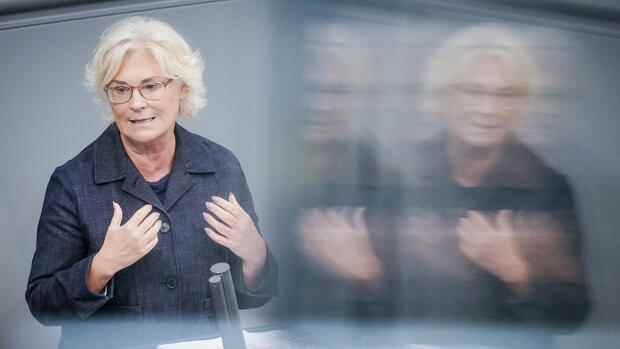Defense Minister Lambrecht wants to spend more money on defense because Germany is a leading military power in Europe and worldwide.
(Photo: dpa)
Berlin The Federal Chancellor has proclaimed a turning point, but Christine Lambrecht has to spell out what that means for Germany militarily. And so the Federal Minister of Defense gave a lecture at the German Council on Foreign Relations (DGAP) on Monday, which the organizers had previously announced as a keynote speech.
It’s about the national security strategy, which is currently being developed across departments, about Germany’s role in the world, about support for Ukraine and NATO allies, about security for future generations. “With our old self-image, the future of peace and freedom for children and grandchildren can no longer be secured,” says Lambrecht. Security must again become a “central task of the state”.
For a long time, the defense minister was primarily a self-defense minister. Her son’s flight in the Bundeswehr helicopter, the high-heeled appearance in Mali, the attempt to persuade Interior Minister Nancy Faeser to go to Hesse – Lambrecht did not necessarily give the impression of being ideally placed in office.
And she is overshadowed by Chancellor Olaf Scholz, who sees security policy as a top priority. At the DGAP, too, the minister had to eloquently explain the chancellor’s course as to why Germany would not single-handedly supply battle tanks to Ukraine.
Top jobs of the day
Find the best jobs now and
be notified by email.
In her speech, the SPD politician speaks unpleasant truths that many citizens, but also many of their party friends, did not want to hear for a long time. America’s protection has long relieved Germany of costs, but the US is now focusing more on the Pacific region. “We will have to spend more money on defense again.”
Lambrecht emphasizes Germany’s role as a leading power
Its size and economic power make Germany “a leading power, whether we like it or not – including in the military,” says Lambrecht. Because democracy has been consolidated, one can also accept this role and make a generous contribution to the security of the Western alliance: “Let’s be ambitious as Germans.”
Read more about the Bundeswehr here:
Even though the coalition is currently working on stricter arms export regulations, Lambrecht does not shy away from touching on this taboo. No partner nation will embark on joint armament projects with Germany if the costs cannot be refinanced through exports, the minister warns against taking a too strict course on this issue: “With our reservation of values, we put ourselves above our European partners.”
Lambrecht has to do some convincing – not so much in the population, which has a “good feeling” for the security policy necessities, but rather in the SPD and in the coalition.
More money for defense, more focus on the Bundeswehr, playing a leading role in Europe – all of these have been red rags for the self-proclaimed peace party SPD. And the more successfully the Ukrainian army resists the Russian aggressor, the faster the support for the turning point could crumble.
At the DGAP, too, the minister had to eloquently explain the Chancellor’s course, why Germany would not single-handedly supply battle tanks to Ukraine.
(Photo: imago images/Sven Eckelkamp)
Lambrecht knows this and warns not to fall back into the old self-image. The actual turning point must take place in people’s minds, and that is often the hardest thing: “Rethinking hurts.” In order to raise awareness of what is necessary, the defense minister proposes a “Day of National Security”.
Invest money wisely
None of your six predecessors who have led the Ministry of Defense over the past 20 years have come up with this idea. Lambrecht has taken over an army trimmed for foreign missions and now has to equip it again in record time and under the pressure of an external threat for its core task of national and alliance defense.
>> Read here: Need for reform in the army: what tasks Inspector Mais has to do
Setting up three combat-ready army divisions by 2032 is “a budgetary and military effort”. But if Germany manages to do this, it will also send an “unmistakable signal” to the allies that Germany is making its contribution to fair burden-sharing in NATO.
The moderator of the panel discussion, which follows the keynote address, asks what she would like to be measured against at the end of her term of office. The Minister of Self-Defense shines through for a moment. At least not on the shoes she wears, says the minister.
She wants the large amount of money that is now being made available not just to be spent, but to be invested wisely in the security of Germany and its allies. That will be her task in the next three years, Lambrecht tells the moderator: “I’m looking forward to her verdict at the end of this legislative period.”
More: Traffic light politicians are heating up the debate about arms deliveries to Ukraine again
